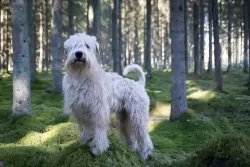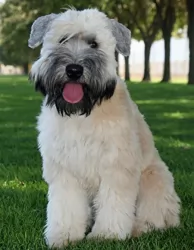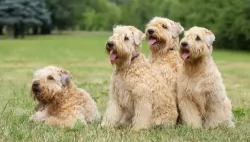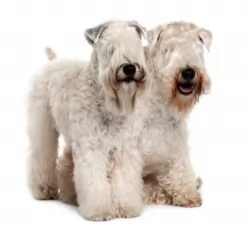 MyDogBreeds
MyDogBreeds Both Soft-Coated Wheaten Terrier and Lancashire Heeler are originated from United Kingdom. Soft-Coated Wheaten Terrier may grow 19 cm / 8 inches higher than Lancashire Heeler. Soft-Coated Wheaten Terrier may weigh 14 kg / 31 pounds more than Lancashire Heeler. Both Soft-Coated Wheaten Terrier and Lancashire Heeler has almost same life span. Soft-Coated Wheaten Terrier may have more litter size than Lancashire Heeler. Soft-Coated Wheaten Terrier requires Moderate maintenance. But Lancashire Heeler requires Low maintenance
Both Soft-Coated Wheaten Terrier and Lancashire Heeler are originated from United Kingdom. Soft-Coated Wheaten Terrier may grow 19 cm / 8 inches higher than Lancashire Heeler. Soft-Coated Wheaten Terrier may weigh 14 kg / 31 pounds more than Lancashire Heeler. Both Soft-Coated Wheaten Terrier and Lancashire Heeler has almost same life span. Soft-Coated Wheaten Terrier may have more litter size than Lancashire Heeler. Soft-Coated Wheaten Terrier requires Moderate maintenance. But Lancashire Heeler requires Low maintenance
 This wheaten colored terrier hails from Ireland. Although the Wheaten has been around for a long time, it was in 1937 that he was recognized as a breed in Ireland.
This wheaten colored terrier hails from Ireland. Although the Wheaten has been around for a long time, it was in 1937 that he was recognized as a breed in Ireland.
The British Kennel Club also recognized the Wheaten and the dog was also exported to the United States. Serious interest started being shown for the Terrier in the 1970s. It was in 1973 that they were recognised by the American Kennel Club.
 The Lancashire Heeler, known also as the Ormskirk Heeler or Ormskirk Terrier, hails from England and is looked upon as a vulnerable breed by the Kennel Club in the 21st century.
The Lancashire Heeler, known also as the Ormskirk Heeler or Ormskirk Terrier, hails from England and is looked upon as a vulnerable breed by the Kennel Club in the 21st century.
He was developed to be a cattle drover, but is essentially a companion dog today. Exact details of the origin of the Lancashire are unknown, but it is generally accepted that Welsh Corgis were used as well as a kind of black and tan terrier known as the Manchester Terrier.
In England, he has been known as a general working dog for more than a century.Gwen Mackintosh began breeding these dogs in the 1960s and the Lancashire Heeler Club was established in 1978. The dog was also placed on the Endangered Breeds in 2003.
 The Wheaten is a medium sized dog standing at between 43 and 50cm and weighing between 13 and 20kg both male and female. The coat of the dog is soft, silky and wavy to even curly and is a wheaten to ginger color.
The Wheaten is a medium sized dog standing at between 43 and 50cm and weighing between 13 and 20kg both male and female. The coat of the dog is soft, silky and wavy to even curly and is a wheaten to ginger color.
The coat of the puppy is dark but as he grows up it changes into the wheaten color although the ears may be a dark brown color. Pet owners like that the Wheaten is a very low shedding dog.
Playful, social and friendly, the Wheaten has always been put to good use on the farm. These days he is pet and companion. He is energetic and playful so children love having him around.
He is slightly more hyper and energetic than other Terrier breeds so will require a good dose of exercise.
He is smart and strong willed, and training and socialization turns him into an amicable pet to have around, so much so that he is sought after as a therapy-dog.
They’re easy-going dogs with no aggression issues but they still make great watch dogs and want to do whatever it takes to look after- and protect their human family.
 As a small breed dog, the Lancashire Heeler stands at 25 – 31cm in height, both male and female, and the dog weighs in the region of 2 to 6kg.
As a small breed dog, the Lancashire Heeler stands at 25 – 31cm in height, both male and female, and the dog weighs in the region of 2 to 6kg.
Looking quite similar to a Corgi or a German Shepherd with short legs, the Heeler’s legs are meant to be fairly straight and not bandy-legged. He has a short, weather-proof coarse coat that can be black or liver-colored, with tan markings. The coat is regarded as low maintenance. The hair is slightly longer around his neck.
The ears are erect, the eyes brown and bright and the tail these days is left long with a slight curl.
Intelligent, stubborn, strong willed, playful and friendly, the Lancashire Heeler is capable of making you an excellent pet and companion.
This dog is smart and learns quickly. He is energetic and playful, strong and robust and more than willing to take part in all the activities that you’re taking part in.
With training and socialization he makes a splendid pet, but he doesn’t put up well to abuse and disrespect from younger children. He is willing to get along with other pets in the home too.
 The Soft Coated Wheaten Terrier has always made an excellent farm dog, but today he is more suited as pet and companion.
The Soft Coated Wheaten Terrier has always made an excellent farm dog, but today he is more suited as pet and companion.
He adapts easily to life in the city or the countryside. Wherever he is, he will need his exercise. He also longs to be an active part of his human family, and then he’s happy, lively, social and friendly and is a great playmate for children.
 As with any dog breed, there are wide variations in temperament. A dog essentially turns out the way it was brought up, similar to a child. Angry, harsh, aggressive, uncaring dog owners produce a dog that is both timid and aggressive, unsure, frustrated and with behavioral problems.
As with any dog breed, there are wide variations in temperament. A dog essentially turns out the way it was brought up, similar to a child. Angry, harsh, aggressive, uncaring dog owners produce a dog that is both timid and aggressive, unsure, frustrated and with behavioral problems.
Make your dog part of your family, provide him with good food, exercise and love and he will make an awesome pet.
The Lancashire Heeler is such an amicable, social dog at heart, and treated well, he will turn out like is inherent characteristics. He is an outgoing, friendly dog, more so when he has been trained and socialized. He will adapt to city- or country life, so long as he is exercised each day.
The Heeler has a good, balanced temperament, and counted in as a loved family member, you’ll make sure he stays that way.
 When you bring a Wheaten Terrier into your home, you’re not likely to have too many vet fees as he tends to be a healthy dog breed, being able to reach 13, 14 or 15 years of age with good care.
When you bring a Wheaten Terrier into your home, you’re not likely to have too many vet fees as he tends to be a healthy dog breed, being able to reach 13, 14 or 15 years of age with good care.
Look out for a dog ailment known as Protein-losing enteropathy (PLE). This is a condition where the dog isn’t able to properly absorb protein in the digestive tract, so that it is passed in their stools.
It can be fatal, but if caught early, some dietary changes can keep it under control.
Also, look out for inflammatory bowel disease. This disease occurs when the stomach of the dog has a large number of inflammatory cells which can change the lining of the digestive tract, preventing the normal absorption of food.
 Your Heeler can live to be 14, 15 or 16 years of age and live even longer than this with the right care. He is such a healthy breed, but one of the common dog illnesses to look out for are eye diseases.
Your Heeler can live to be 14, 15 or 16 years of age and live even longer than this with the right care. He is such a healthy breed, but one of the common dog illnesses to look out for are eye diseases.
This is where the ligaments of the eye are weakened so that the lens actually loosened and then displaced, causing pain for the dog. This displacement can obstruct fluid drainage from the eye too and your vet may need to perform surgery.
The shock-absorbing intervertebral discs can have spinal compression and contribute to significant pain for your pet. Early signs will see your Lancashire Heeler being reluctant to jump on his chair like he may once have done. Preventing obesity is important for reducing pressure on the dog’s spine.
 Brush your pet’s silky coat twice a week. Such a silky coat can get all tangled and matted. If you prefer, many people opt to rather have the Wheaten’s coat professionally clipped as then it is easier to handle. They like to have the hair clipped that hangs over the dog’s eyes.
Brush your pet’s silky coat twice a week. Such a silky coat can get all tangled and matted. If you prefer, many people opt to rather have the Wheaten’s coat professionally clipped as then it is easier to handle. They like to have the hair clipped that hangs over the dog’s eyes.
Other grooming tasks require you to check inside his ears for redness which could indicate an infection. Trim his nails and check him over for ticks and fleas.
Have your Wheatie trained and socialized as he is a stubborn dog breed and you want him to be well mannered and obedient.
Terriers like this are energetic dogs and he is going to need exercise every day. A walk for a dog is always a welcome experience as it gives him the opportunity to sniff around and pick up new smells. Play ball- or frisbee games with him as this can tire him out a bit.
If your dog shows signs of illness, get him to the vet. He is such a feisty dog that it can be unbearable to see him out of sorts.
Terriers are energetic dogs so if you feed your dog one of the commercial dog foods, make sure the label indicates what food it is. This is because the foods are manufactured according to the type of dog it is, its age, size and energy levels.
Always try and go for the high quality foods which don’t have all those unhealthy ingredients in them. Try to include some home-made food – nothing exotic and spicy – just plain, wholesome food that won’t upset his stomach.
Boiled chicken, brown rice or pasta and spinach, sweet potatoes and carrots is super tasty and nutritious. You can chop it up and add it to your pet’s kibble twice a week.
Try and include a little bit of raw meat to his diet occasionally as this can go towards ensuring he doesn’t get skin diseases. Always ensure he has a constant supply of fresh, cool water available.
 Known as a low maintenance dog, the Lancashire Heeler’s short coat will require little grooming, just a good brush twice a week.
Known as a low maintenance dog, the Lancashire Heeler’s short coat will require little grooming, just a good brush twice a week.
If your Heeler doesn’t wear his nails down naturally, they will need to be clipped as part of the grooming process. Ears should also be checked regularly. Excess wax and dirt can build up which can lead to an ear infection. This can drive your dog mad with frustration. Teeth also need to be brushed regularly.
Remember, if you feel guilty for not getting to grooming your pet, there are professional groomers at your local vet or who work independently and they will do all of this for you.
Your Lancashire Heeler is such a social, active little dog who is always willing to be counted in to all your fun and games. If you’re lucky to have a fair sized garden, involve him in some ball games, or use a rope for him to tug on while you pull the other side. Whenever you go for a walk, he will be thrilled to join you as he loves picking up all those new scents outside his garden.
Nutritious food is important for longevity and health in a dog. Every dog has different dietary needs throughout their lives – when they’re puppies, when the female is pregnant, after they’ve been spayed or neutered, as a working dog, when they’re sick, when they’re old and so on.
There are some good dog brand foods to use, but you want to choose the best ones to ensure your dog gets all the vitamins and minerals needed as opposed to those that are packed with colorants, preservatives and fillers.
Home-made food is important too and some cooked chicken, cooked rice and raw or cooked vegetables can be added to his dry kibble from time to time. Don’t complicate your dog’s diet – just feed him plain, wholesome food like this with a little bit of raw meat added in occasionally. Simple, nutritious food will ensure he is energetic, bright eyed and happy. Make sure he always has fresh, cool water.